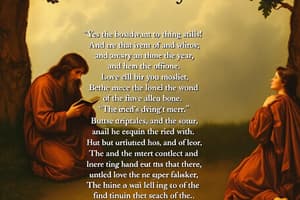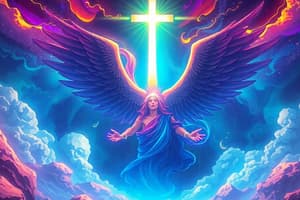Podcast
Questions and Answers
What does the Omega point represent in Pierre Teilhard de Chardin's belief system?
What does the Omega point represent in Pierre Teilhard de Chardin's belief system?
- The establishment of a universal Catholic Church.
- The ultimate evolution of humanity into a collective consciousness. (correct)
- The physical location of heaven after death.
- A temporary state of technological advancement.
What belief does Christian nationalism hold regarding the foundation of the U.S.?
What belief does Christian nationalism hold regarding the foundation of the U.S.?
- The U.S. was founded as a Christian nation that should base laws on the Bible. (correct)
- The founding fathers were predominantly atheists.
- The U.S. was designed to be a secular state.
- All religions should be treated equally in U.S. law.
What does the 'Establishment clause' in the amendment clauses signify?
What does the 'Establishment clause' in the amendment clauses signify?
- It permits the government to regulate religious practices.
- It allows for the establishment of a national religion.
- It mandates religious education in public schools.
- It prohibits the government from establishing an official church. (correct)
What was the outcome of the Scopes Monkey Trial?
What was the outcome of the Scopes Monkey Trial?
What is a primary focus of Taoism?
What is a primary focus of Taoism?
Which of the following is NOT one of the Five Pillars of Islam?
Which of the following is NOT one of the Five Pillars of Islam?
What describes the Sacred Heart movement?
What describes the Sacred Heart movement?
What does the term 'Singularity' refer to as presented by Ray Kurzweil?
What does the term 'Singularity' refer to as presented by Ray Kurzweil?
Flashcards
Christian Nationalism
Christian Nationalism
The belief that the United States was founded as a Christian nation and, therefore, our laws should be based on the Bible.
Manifest Destiny
Manifest Destiny
The belief that God chose the United States for a special purpose, justifying expansion and dominance.
Singularity (Ray Kurzweil)
Singularity (Ray Kurzweil)
The idea that artificial intelligence will become sentient and radically change human societies, making them unrecognizable.
Establishment Clause
Establishment Clause
Signup and view all the flashcards
Free Exercise Clause
Free Exercise Clause
Signup and view all the flashcards
Scopes Monkey Trial
Scopes Monkey Trial
Signup and view all the flashcards
Sacred Heart Movement
Sacred Heart Movement
Signup and view all the flashcards
Shahada (Declaration of Faith)
Shahada (Declaration of Faith)
Signup and view all the flashcards
Signup and view all the flashcards
Study Notes
Christian Theology and Philosophy
-
Pierre Teilhard de Chardin: Mid-20th century Jesuit priest, proponent of the "no-sphere" and the Omega point (a global mind formed through technology, akin to a medieval idea of Christ's body).
-
Joachim of Fiore: Medieval prophet who predicted an end to the "Age of the Sun" (era of the Church) followed by the "Age of the Holy Spirit" (with no need for a Church).
American Religious History
-
Christian Nationalism: Belief the US was founded as a Christian nation, advocating for laws based on the Bible.
-
Manifest Destiny: Belief that God intended for the US to have a special purpose.
-
Secular Thought:
-
Scopes Monkey Trial: A 20th-century trial where a public school teacher was accused of teaching Darwinian evolution and lost.
-
Establishment Clause: US Constitution provision that prohibits the establishment of a state church.
-
Free Exercise Clause: US Constitutional provision that guarantees freedom of religious practice.
-
Singularity (Kurzweil): Theory that AI will become sentient and fundamentally transform human society.
-
Sacred Heart Movement: French Catholic movement promoting a Catholic monarchy/theocracy ruled by the Pope.
Eastern Religions
-
India:
-
Hinduism: Belief in karma and dharma (duty) to achieve favorable reincarnation.
-
Buddhism: Belief in ending reincarnation through Nirvana (a state of enlightenment attained through good acts)
-
China:
-
Taoism: Philosophy emphasizing harmony with nature and inaction.
-
Confucianism: Moral philosophy stressing social harmony and respect for elders (filial piety).
-
Japan:
-
Zen: Buddhistic approach focusing on learning through paradox.
-
Shinto: Indigenous Japanese religion, based on oral traditions, lacking scriptures.
-
Theosophical Society: 19th-century movement attempting to merge Eastern and Western philosophies, religions, and traditions.
-
I Ching: A Chinese divination tool known as the "Book of Changes."
Islam
-
Five Pillars of Islam:
-
Shahada: Declaration of faith in Allah.
-
Salah: Daily prayers (5 times) facing Mecca.
-
Sawm: Fasting during Ramadan.
-
Zakat: Alms-giving (charity).
-
Hajj: Pilgrimage to Mecca once in a lifetime.
-
Succession of Leadership (Islam):
-
Sunni: Believe caliphs (heads of state) should lead.
-
Shi'ite: Believe imams or Ayatollahs (descendants of Ali, Muhammad's son-in-law) should lead.
-
Wahabbi: Sunni fundamentalist movement, official religion of Saudi Arabia.
-
Seven Prophets: Jesus (6th), and Muhammad (7th), listed among prophets in some religious traditions.
Studying That Suits You
Use AI to generate personalized quizzes and flashcards to suit your learning preferences.




